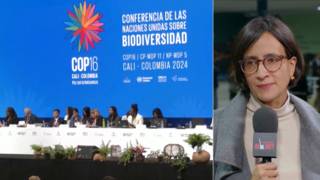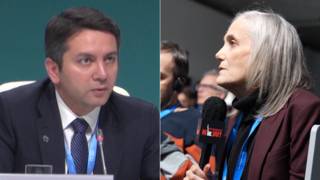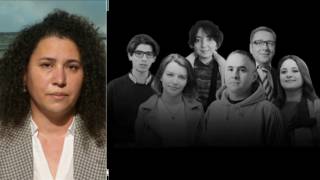
Related
B’Tselem has given Palestinian families across the West Bank video cameras to document how they are treated by Israeli soldiers and settlers. Some of the videos depicting abuse by settlers sparked a national debate earlier this year after they were broadcast on Israeli television. We speak with Oren Yakobovich who coordinates B’Tselem’s video department. [includes rush transcript]
Transcript
AMY GOODMAN: We turn now to a second round of Israeli-Palestinian negotiations, which was stymied on Monday after Israel refused to halt its settlement activity. At the US-sponsored peace conference in Annapolis last month, Israel agreed to end settlement expansion. But the Israeli Construction Ministry unveiled a proposal Sunday to build 740 new homes on occupied Palestinian land near East Jerusalem.
The Israeli human rights group B’Tselem has given Palestinian families across the West Bank video cameras to document how they’re treated by Israeli soldiers and settlers. The project is called “Shooting Back.” Some of the videos depicting abuse by settlers sparked a national debate in Israel earlier this year after they were broadcast on Israeli television.
Oren Yakobovich coordinates B’Tselem’s video department. He recently traveled to the United States, joined me here in the firehouse studio. I began by asking him to explain the project, “Shooting Back.”
OREN YAKOBOVICH: “Shooting Back,” it’s basically giving a Palestinian that’s living in high-risk areas that’s probably going to suffer from human rights violation by the Israeli army and by settlers — we give them cameras, so they can film their life, and basically we can see the violation when it’s occurred.
AMY GOODMAN: How did you come to do this?
OREN YAKOBOVICH: Right. B’Tselem, the Israeli Information Center for Human Rights, is documenting violation since ’89, and the aim is to bring to the Israeli public and to the public in the world and decision makers violation. And the aim is, of course, to advocate for the end of violation. I wish I would not be here speaking about violation, but it’s happening all the time.
So, for many years, what we did, we did reports. We’re still doing them. And it’s a long-term report. We’re investigating the situation in the field. We had field researchers in every big city in the West Bank that — taking testimonies, written testimonies. And we did some films about the reports that we were taking out, but there was kind of frustration that I felt all the time, or we felt in B’Tselem, because we know from written testimony that a lot of things are happening, and we don’t really manage to see them. It was becoming hard, harder, more and more during the years, to bring new information or new visuals to the media and to grab public attention. And we looked for a different point of view, a new point of view, and this is how we decided to start giving cameras to these people that live in these places.
AMY GOODMAN: Where do you get the cameras?
OREN YAKOBOVICH: Where we get them from?
AMY GOODMAN: You just —- you buy them and then give them to -—?
OREN YAKOBOVICH: Yeah, we buy them.
AMY GOODMAN: And so, do you have support of people in Israel?
OREN YAKOBOVICH: We have support of people in Israel, also in the world. B’Tselem is an NGO, and we — fund by contributions. So we take —- we raise money, and we buy the cameras and give them.
AMY GOODMAN: What does “B’Tselem” actually mean, the Hebrew word?
OREN YAKOBOVICH: The word itself, OK, “B’Tselem” is come from the Bible, and the first sentence in Genesis is God created man in His shape. In His shape -—
AMY GOODMAN: In His image.
OREN YAKOBOVICH: In image, yes. So, in His image, the Hebrew word for it would be “B’Tselem.” So that’s where it’s coming from. Even though we are not with this organization at all, but the aim is, of course, to point that everyone has been created in the shape of God, and everybody is equal.
AMY GOODMAN: Oren, describe this first video we’re about to watch and listen to.
OREN YAKOBOVICH: Alright. OK, well, this is basically the first video that we took out for the media. It’s happening in Hebron. Just to understand, Hebron is the only Palestinian city where Jewish settlers living in the heart of the city. Usually the settlements will be outside of the major city, around or close by, but not inside. In Hebron, basically because Abraham, the father of our religion, is buried there, it’s a very holy place to the Jews also, and there’s settlements in the heart of the city.
The result of the settlements is a lot of restriction of movements on — that are being held on Palestinians. There are many streets that they cannot really walk. A Palestinian cannot drive cars in these areas. And there is a lot of violation that’s happening there from the settlers that are living there. There are very radical settlers, more radical even than the rest of the West Bank. And we know from a lot of years of watching the place or getting testimonies that a lot of violations is happening there.
What you’re going to see is a clip from a settlement called Tel Rumeida in Hebron. What we will see is a settler from this settlement, from Tel Rumeida, pushing Palestinians that basically are living across the street, on the other side of the road, pushing her back to her home, calling her “whore,” cursing her very viciously. And all this time, you see the soldier standing next to the woman doing nothing, not interfering.
AMY GOODMAN: Tell us about the Palestinian family, in particular the woman, both the Palestinian woman and the Jewish settler woman.
OREN YAKOBOVICH: Yeah, OK. So the Palestinian is part of part of Abu Eisha family that’s living in the heart of Tel Rumeida. They’ve been there for years, a lot of lot of years. In ’84, if I’m not mistaken, or ’83 — I don’t remember — the settlement started, the Jewish settlement started in Hebron. The street that was open all the time to the family and to the people to come to visit her was closed. And now, this is the only Palestinian family that can walk in the street, the people living in this house. And they have nowhere to — the only way out from this house is through this road. So basically every time they’re going out from the door, they’re confronting the settlement — the settlers. And you will see this clip, and after, you see more clips, because we get a lot of material from this family. They are being attacked on a regular basis. Every time they go out of the house, there’s a good chance they’re going to get stones from the children or from the people that are living across the street, from the settlers.
AMY GOODMAN: And tell me about this particular settler woman.
OREN YAKOBOVICH: Don’t say her name, but she is a radical settler, and she’s living on the other side of the street. And she’s kind of representing the settlers population living in Hebron. And I have to say that even for the Israeli audience, she seems extreme, like she’s very extreme. But what we know about her, this is not the first time she’s attacking, not her, not her friends. There’s attacks happening there regularly on a regular basis. And what we see, that the army and the police are not enforcing the law, or there is lack of enforcement there.
AMY GOODMAN: Let’s watch.
HEBRON PALESTINIAN RESIDENT: [translated] She wants to lock us in.
ISRAELI SETTLER: [translated] Get in the house. Get in the house.
HEBRON PALESTINIAN RESIDENT: [translated] I won’t close the door.
ISRAELI SETTLER: [translated] Close it. Close the door.
HEBRON PALESTINIAN RESIDENT: [translated] Stay out of this!
ISRAELI SETTLER: [translated] Close the door.
HEBRON PALESTINIAN RESIDENT: [translated] Stay out of this! I’m not closing the door.
ISRAELI SETTLER: [translated] Sit here, in the cage. Sit here. Close the door.
HEBRON PALESTINIAN RESIDENT: [translated] I don’t want to go inside!
ISRAELI SETTLER: [translated] Close the… Get the camera out of here.
HEBRON PALESTINIAN RESIDENT: [translated] Call the police.
ISRAELI SETTLER: [translated] Turn the camera off.
HEBRON PALESTINIAN RESIDENT: [translated] It’s early in the morning. What do you want from us?
ISRAELI SETTLER: [translated] Shut up!
HEBRON PALESTINIAN RESIDENT: [translated] Don’t you [addressing soldier] see what she’s doing?
ISRAELI SETTLER: [translated] Whore.
HEBRON PALESTINIAN RESIDENT: [translated] You are!
ISRAELI SETTLER: [translated] Whore.
HEBRON PALESTINIAN RESIDENT: [translated] You are! Go away!
ISRAELI SETTLER: [translated] Whore.
HEBRON PALESTINIAN RESIDENT: [translated] Look what she’d doing! Go away!
ISRAELI SETTLER: [translated] Whore.
HEBRON PALESTINIAN RESIDENT: [translated] Go away, you bitch!
ISRAELI SETTLER: [translated] Whore.
HEBRON PALESTINIAN RESIDENT: [translated] Did you see [addressing soldier] what she did?
ISRAELI SETTLER: [translated] Whore. Whooooore. You’re a whore. Your daughters, too. Don’t you dare open this door!
HEBRON PALESTINIAN RESIDENT: [translated] Don’t you dare come here!
ISRAELI SETTLER: [translated] Whore.
HEBRON PALESTINIAN RESIDENT: [translated] I’ll leave the house, as I please!
ISRAELI SETTLER: [translated] Whore.
HEBRON PALESTINIAN RESIDENT: [translated] Leave us alone! Soldier, do you see what she’s doing?
AMY GOODMAN: That video was filmed in Hebron. The Jewish settler woman, the Palestinian woman was filmed by who, Oren?
OREN YAKOBOVICH: The sister of the Palestinian who’s being cursed is the one that’s filming. Basically, there is a kid there, sixteen years old, holding a camera while her sister is being attacked by the settler. You see that the settler is coming to the camera, trying to push her into the house. And her sister is just next to her filming. And she’s filming from — you see, I think it’s a barbwire or like, you know, a net from —-
AMY GOODMAN: Through barbwire?
OREN YAKOBOVICH: Through barbwire, yeah, I think, because it’s called the cage house. Because they have so many troubles from the settlers, they have to build kind of a barbwire around their house so they will not -— to protect the windows from the stones, to protect them the stone and from all kinds of things that they’re throwing there.
AMY GOODMAN: Did this video appear on Israeli television?
OREN YAKOBOVICH: Yeah. This video was — what was amazing, I need to say, about this video, that for the Palestinian, when they gave me the camera, they gave me the tape, they didn’t talk about this video, because for them it’s casual. They didn’t think there was anything special in this video. While we watched it in the office in B’Tselem, we said like there’s something very strong here that we need everybody to see. But for the Palestinians, they didn’t say anything about this video.
And then we put it out on one of the Israeli internet-used channels, and very fast there was a lot of — about hundreds of talk-backs and hundreds of clicks on this video. Of course, hour after, I got a great response from the rest of the networks in Israel, news networks. The day after, it was everywhere in Israel. It caused a major —-
AMY GOODMAN: So it first appeared on the web, then the networks took it.
OREN YAKOBOVICH: Yeah, yeah, yeah. And it was -— we were amazed what a debate it made in Israel. And the thing is, you have to understand, our problem at B’Tselem is not the settlers, the settlers that are violent. Our problem is the policy, the lack of law enforcement, that the soldier is standing there and doing nothing, and the police are there close by and doing nothing. And this is the major problem. And this is what was the debate about, because people in Israel, the audience or the majority in Israel, they will not pick up — or maybe they do, I’m not sure — but the settler is quite radical from their point of view also. The major debate was about the soldiers are standing there and doing nothing.
So the day after, it was in all the news channels in Israel, being talked again and again. A lot of article was written about it in the newspaper. After a while, the Prime Minister related to it, the Defense Minister related to it.
AMY GOODMAN: You mean, Ehud Olmert had to address it, speak about it?
OREN YAKOBOVICH: Yeah, Olmert said he saw it, and he felt ashamed. That’s what he said. And the moment, of course, they addressed it, then the rest of the networks all around the world wanted this clip, because it became a huge issue. And then CNN took it, ABC took it. It was in Europe in all kind of channels, in Brazil, Japan. So it was widely watched. And what was amazing, this one minute that a Palestinian woman filmed, she’s a citizen or a nonprofessional filmmaker, just made one minute that basically changed the situation there.
AMY GOODMAN: How old was the girl who filmed it?
OREN YAKOBOVICH: Sixteen.
AMY GOODMAN: She’s sixteen. And where is she now? Still there?
OREN YAKOBOVICH: Still in the house, yeah. Still in the house. I have to say that the reality didn’t change drastically. It did reduce some of the violations that are happening in Hebron. That’s what we heard also from the family itself. We know that the presence of the cameras there is reducing the violence, because people know that they are being filmed.
AMY GOODMAN: And the settler woman?
OREN YAKOBOVICH: She’s still there. She’s still there. I think, if I’m not mistaken, she was supposed to come to a hearing last week in the court about this case, didn’t appear. She’s still there.
AMY GOODMAN: I want to go to the second video. We’re talking to Oren Yakobovich. He directs the video department of B’Tselem, the Israel Information Center for Human Rights, giving video cameras to Palestinians. Describe this.
OREN YAKOBOVICH: Yeah. The second video, what you see here, it’s happening on a Jewish holiday called Purim. In this holiday, I don’t know if you know, but people are allowed to drink in the street, and you’re allowed to drink. In Hebron also the kids are drinking, and we see some drunk kids there. They are the sons of Barukh Marzel. He’s head of one of the radical movements in Israel. We see —- in the beginning, we see the soldiers a little bit holding the kids, but they’re running away. And they’re getting into the same family house through the door and throwing stones again and cursing and saying that they’re going to destroy them. And then, a little bit after, you see the brother of the same kids, also drunk, just kicking wildly the door. And then -—
AMY GOODMAN: And this is the door of the Palestinian home.
OREN YAKOBOVICH: This is the door of the Palestinian home. And again, soldiers are there. They are walking on the streets. They are close by. Nobody is stopping them. Then you see him lying on the road next to the house and cursing and shouting ’til his father’s coming to take him.
AMY GOODMAN: Let’s watch.
[describing clip] The settler boy says, “I will exterminate you,” and throws a stone at the Palestinians’ home. “Go away!” he says. “Don’t you dare film me,” he says to the girl filming.
That video was filmed by the same sixteen-year-old girl of the Abu Eisha family who filmed the first clip that we saw. How much attention did this get of the Jewish settler’s son kicking in the door of the Palestinian?
OREN YAKOBOVICH: This got attention also in the news, of course. It was not internationally attentioned, but it got a lot of coverage in the Israeli media. But I have to say that it’s very hard to — very important to understand that there’s things happening not just to this family, it’s happening all over Hebron. It’s happening everywhere where there are settlers in Hebron. The violation is there all the time. The violent acts you see in other cameras also. Just brought this one, because this is how we started the project, but you see it all over.
AMY GOODMAN: Talk about this next clip we’re about to see.
OREN YAKOBOVICH: OK, what you’re going to see now is a different clip, because there are cameras in all kind of places, so you’re getting different footage from all kind of places.
What you’ll see now is — there is a kind of routine that the Israeli army is doing when there is somebody that they notice. This is what’s something that’s called the wanted list. It’s kind of a list that in the head of the list is the one that’s most wanted, is considered a terrorist. And then after, there’s the whole list. Whenever there is information about somebody on this wanted list, this kind of operation that the army is doing — it’s quite regular. It’s happening a lot in the West Bank. Now, when we come to this house, surround this house, and then we call to the people to come out. We’re checking the people. If the one that they wanted is not out, they will start throwing stun grenades, shooting on the walls, and then they will start destroying the house. And what we see here is the operation that happened in Qalqiliya, and it’s quite routine operation.
AMY GOODMAN: Where is Qalqiliya?
OREN YAKOBOVICH: Qalqiliya is in the West Bank, north of the West Bank, one of the big cities in the north of the West Bank. What we see is quite a routine. The thing is that in this occasion, there were twelve houses being destroyed. And they walked them in the street with their underwear.
AMY GOODMAN: The whole family.
OREN YAKOBOVICH: Not just family, the people from this area that was living there. So we got these testimonies, and it’s very hard to make the army or make the police start investigating, when you have these testimonies written. But the moment you have a strong video, it’s much more easy to make a case. What you see in this video, you see the operation itself, you see bulldozer destroying the house, you see people with underwear walking down the street.
AMY GOODMAN: And this is men, women and children?
OREN YAKOBOVICH: No, just men, just men. No children and no women, just men, just men walking in the street. You see the soldiers. You see the dogs. They’re sending a dog, after the house was destroyed, to look for the wanted one. You see basically the operation itself. And it’s something that we got a lot of written testimonies about, but we never saw it happening. And here, we have the point of view of the Palestinians. You can hear in the background, this kid’s talking to him, asking him to be careful that they will not shoot him. So you see kind of a Palestinian life, or where he’s filming for a feel, you feel the life, and the visual, as you see, the operation itself.
AMY GOODMAN: Again, that was filmed at Qalqiliya. And Oren, who filmed it?
OREN YAKOBOVICH: This Palestinian guy that’s living just across the street.
AMY GOODMAN: Just happened to have the camera there that day.
OREN YAKOBOVICH: Yeah.
AMY GOODMAN: And what kind of reaction did this film get?
OREN YAKOBOVICH: This didn’t get much reaction. This film was helping us to analyze the operation, was helping us to ask the army to start investigation. This is something that we do at B’Tselem quite regularly. When we target violation, we see a violation, we’ll ask the army to investigate this violation. We’ll try to get conclusion on what’s happening there. So this didn’t get a lot of media attention, but it helped us to work, and it’s something that’s going to the army.
AMY GOODMAN: How is the army dealing with you, with B’Tselem, with — as you’re saying, B’Tselem is a longtime, very well respected human rights information center —-
OREN YAKOBOVICH: Yeah.
AMY GOODMAN: Yet even B’Tselem, you put out reports based on people’s testimony -— they don’t respond very much. But now you have the video. So how is the army dealing with this?
OREN YAKOBOVICH: First of all, they do respond to reports, this I have to say. Every time we’re getting a report out, we’re getting back a reaction from the army, a letter written in reaction. And we publish it together with our report. It’s very important to have this and to make sure that it’s there, that we know how the army will respond to this report.
The thing is that they’re asking us to film now. The army and the police are asking us to film. They’re telling us, “If you have things that’s happening, please bring us the video,” because they need it. They need it because they sometimes just get between the commanders or the high-rank officers in the army that at least see themselves as people that will try to protect the law and what’s happening in the field. So the video is helping them to see what’s happening there. They will ask for the film to investigate sometimes, to see what’s happening there.
AMY GOODMAN: Have any charges been brought based on the video footage?
OREN YAKOBOVICH: We know that charges was in Hebron against the woman that was attacking. This process is quite new. We started a year ago with the pilot. And in the last months, we’re running this project all over the West Bank. And investigation is taking time usually. It’s something that will — we don’t know the effects ’til the end, but we know it’s did helping to make investigation.
AMY GOODMAN: If the army is encouraging you to do this, why don’t they just hand out video cameras to all Palestinians?
OREN YAKOBOVICH: This is a very, very good question. I hope they will do. I hope they will give everyone cameras there, to the Palestinians, to the settlers, to the soldiers. And everything should be seen.
AMY GOODMAN: And the title of this project, why did you choose “Shooting Back”?
OREN YAKOBOVICH: Because it’s shooting back. It’s, first of all, kind of a weapon that a Palestinian has against human rights violation. Of course, I would prefer that people will have cameras and not guns. So it’s — and then they are shooting back.
AMY GOODMAN: And what, ultimately, do you hope to achieve?
OREN YAKOBOVICH: First of all, I have to say that we’re spreading more and more cameras all over the West Bank. In every place when there is a tension and [inaudible], we give them cameras. This is very important. And I know that it’s protecting the Palestinians. There are places that we know, when the Palestinian is taking out the camera, the settlers will run away, will escape, happening a lot in south of the West Bank.
It’s giving power. You know, this word is called “empowerment.” I don’t like this word so much, but I will use it. It’s the children and the kids are filming. It’s helping to mobilize communities. In Hebron, where the community was destroyed, suddenly they’re filming and they have some kind of an interest in seeing the videos, talking about it. And what I hope to achieve, that everything is going to be filmed, at least in the — there’s going to be a feeling that everything is being filmed, nothing is being done in the dark. And this what B’Tselem was basically established for, to bring light to places that are in the dark so violation will not occur.
AMY GOODMAN: Oren Yakobovish is with the Israeli human rights group B’Tselem, which has given Palestinian families across the West Bank video cameras. The project is called “Shooting Back.”











Media Options